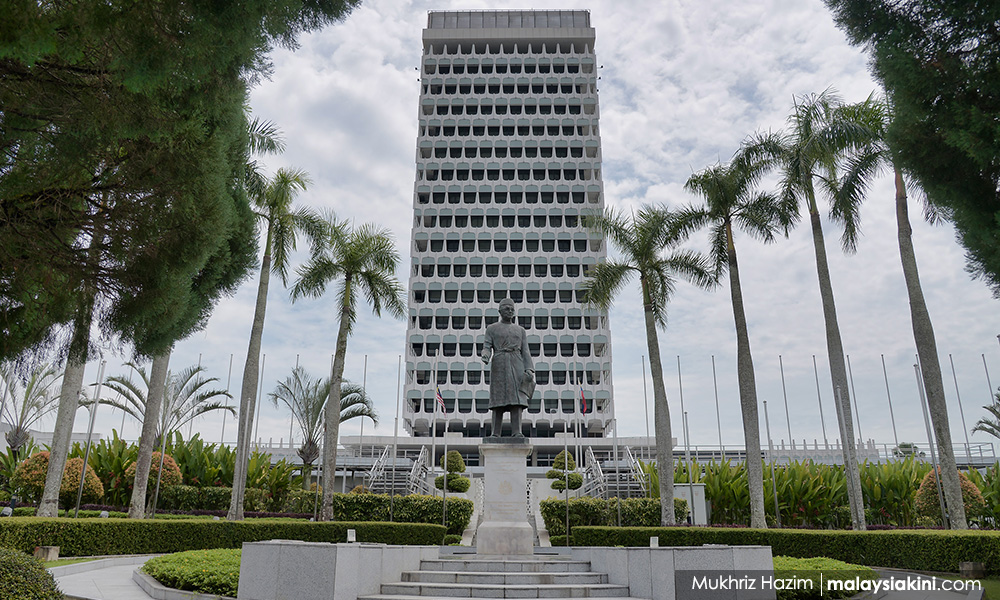The proclamation of the state of emergency may lead to arbitrary arrests that may infringe on freedom of expression and other civil liberties, the Centre for Independent Journalism (CIJ) warned today.
"Immediately following the proclamation of emergency, the Malaysian Multimedia and Communication Commission (MCMC) said it would monitor the spread of disinformation and statements deemed to touch on the sensitivity of royalty, religion and race and action will be taken under the law," CIJ executive director Wathshlah G Naidu said in a statement.
Yesterday, the Yang di-Pertuan Agong had consented to the Prime Minister Muhyiddin Yassin's request for a state of emergency until Aug 1 in the wake of the growing number of Covid-19 cases.
Wathshlah said although the emergency was not a military coup, as stated by Muhyiddin, but that an ordinance could be proclaimed to give enforcement power to the armed forces.
"Such a step (giving the armed forces more power) signals the government’s intention to curb our ability to engage effectively in public life.
"This foretells a possibility that this emergency is likely to be used to justify arbitrary arrests and investigations that infringe on freedom of expression and other fundamental liberties.
"This also shows the possibilities of heightened military presence and attempts to further curtail our liberties..."
Wathshlah questioned the need for an emergency when the movement control order was reinstated in five states and three federal territories to contain the pandemic.

She said the suspension of Parliament and State Legislative Assembly sittings would undermine the sanctity of parliamentary democracy.
"The imposition of an emergency on a sceptical public at a time when the prime minister and his government are already struggling with legitimacy warrants a higher threshold of accountability through legitimate checks and balances like Parliament," she added.
Wathshlah said Parliament and the state assemblies should be allowed to convene virtually, if not physically.
She said the media must be guaranteed space to do their jobs independently and access to information should be promoted, not restricted.
Wathshlah urged the government to create a safe environment for discussion and criticism by refraining from using scare tactics and arbitrary applications of repressive laws to intimidate critics.
"The move by the prime minister to call for an emergency reeks of political opportunism and a quest to retain power in the context of the current volatile political landscape.
"It is incumbent on the government to protect our fundamental human rights and not be complicit in misusing the emergency for personal or political expediencies," she added.
Suppression of democratic rights
In another statement, the Malaysian Bar said the rule of law should be safeguarded in an emergency, but noted that there are almost no mechanisms to keep executive power in check.
“We hope that any law intended by the executive for the purpose of strengthening enforcement to curb the spread of Covid-19, will not be unduly harsh.
“The Malaysian Bar is equally concerned about the ramifications that this Emergency will have on human rights and civil liberties, as ordinary legal procedures need not be followed when Parliament makes laws,” said Malaysian Bar president Salim Bashir.
Salim said there are already sufficient existing laws to tackle the Covid-19 pandemic without declaring an emergency, and the emergency would act as a “circuit breaker” to halt internal political dissent by preventing elections from taking place.
“However, this would inevitably have an impact on some frontiers, including our economy and constitutional rights,” he said.
Meanwhile, the Society for the Promotion of Human Rights (Proham) also expressed grave concerns over the emergency proclamation.
"We have grave concerns over the suspension of Parliament, which in many ways is the suppression of fundamental democratic rights.
"We urge the government to provide details on the setting up of an independent panel to review the state of emergency.
"The activities of Parliament and the works of parliamentary select committees should be allowed to continue," Proham said.
The Human Rights Commission of Malaysia (Suhakam) should also play a bigger role in investigating human rights abuses during this period, Proham added.
"We also call for the enlargement of the term of reference of the independent panel to give it the power to review any abuse of powers and curtailment of human rights."
Proham also said that civil society members should be appointed to the independent panel to reflect a strong multi-stakeholder approach.
Opposition parties have alleged that Muhyiddin had resorted to using the emergency to retain power after he had lost majority support when three Umno MPs withdrew their support for him.
Delay in ongoing labour reforms
Separately, the Labour Law Reform Coalition (LLRC) expressed concern that suspending parliament could delay ongoing labour reforms and render some existing reforms unenforceable.
LLRC co-chairpersons N Gopalkishnam and Iren Xavier said amendments to the Industrial Relations Act have already come into force on Jan 1 this year, but the related amendments to the Trade Union Act and Employment Act are still pending.
Without further amendments to the latter two laws, authorities would not be able to enforce many provisions in the Industrial Relations Act.
“The delay in the parliamentary process will negatively impact Malaysian workers’ freedom of association and the government’s effort to align domestic laws with international labour standards. The status quo means the majority of workers are left unprotected by effective trade unions, which are able to collectively bargain for better wages, benefits and working conditions for workers.
“The absence of collective bargaining at workplaces will defeat the government’s target to achieve 48 percent labour income share as stated in the shared prosperity vision 2030. It also allows employers to unilaterally terminate workers without a bargaining process during the Covid-19 pandemic.
“Labour law reform is a critical strategy for the government to protect workers’ rights and achieve the 48 percent target from current 35.7 percent,” they said in a statement. - Mkini



No comments:
Post a Comment
Note: Only a member of this blog may post a comment.